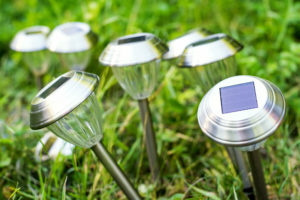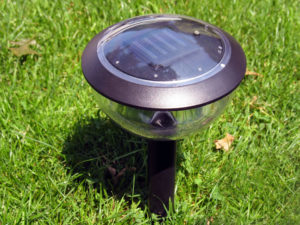Have you ever noticed the on/off switch on solar lights? Is there really a need to turn them off? Won’t they just turn off automatically when the sun goes down? Turns out, there’s a good reason for it. Keep reading to find out what it is!
Contents
- 1 The Reason Why There Is an On/Off Switch on Solar Lights
- 2 How to Maintain Your Solar Lights
- 3 Solar Lights FAQs
- 3.1 What should I do if my solar lights don’t turn on at night?
- 3.2 Is there any way to keep solar lights from fading throughout the season?
- 3.3 How long do solar lights last?
- 3.4 What’s the difference between LED and incandescent solar lights?
- 3.5 Can I use solar lights indoors?
- 3.6 Do I have to put my solar lights in the sun?
- 3.7 I have a motion sensor solar light. Do I need to turn it off?
- 3.8 Where can I place solar lights?
- 3.9 How do solar lights recharge?
- 3.10 Do solar lights work at night?
- 3.11 How long does it take for solar lights to turn on?
- 3.12 What should I do if my solar light isn’t working?
- 3.13 Is my solar lighting waterproof?
- 4 Our Reviews of Solar Lights
- 5 Our Expertise in Solar Lights
- 6 Summary
The Reason Why There Is an On/Off Switch on Solar Lights
The on/off switch on solar lights is there for a reason. It’s not just to make it easier for you to turn them off – it actually helps the lights run more efficiently! When the switch is in the “on” position, it allows current from the battery to flow through the light. This keeps the light bright and prevents it from dimming over time.
When the switch is in the “off” position, it cuts off the current to the light. This keeps the battery from draining unnecessarily and helps to prolong its life.
How to Maintain Your Solar Lights
 Solar lights are a great way to reduce your energy consumption and save money on your electric bill, but they require some regular maintenance to work properly. One of the most important things you can do to keep your solar lights running is to make sure that the switch is turned on! Many people forget to flip the switch when installing their solar lights, which can lead to decreased performance or even a dead light.
Solar lights are a great way to reduce your energy consumption and save money on your electric bill, but they require some regular maintenance to work properly. One of the most important things you can do to keep your solar lights running is to make sure that the switch is turned on! Many people forget to flip the switch when installing their solar lights, which can lead to decreased performance or even a dead light.
Another thing you’ll want to check regularly is the angle at which your solar panels are facing. Make sure that they’re pointed towards the sun as much as possible; if they’re not getting enough sunlight, your lights won’t charge properly. You may also need to clean your solar panels every once in a while; simply wipe them down with a damp cloth to remove any dirt or debris.
If you follow these tips, your solar lights should provide plenty of illumination for years to come!
Solar Lights FAQs
What should I do if my solar lights don’t turn on at night?
You may need to replace the batteries. If they are rechargeable, make sure that you’re using the right charger for your battery type. And even if they aren’t rechargeable, it’s still possible that there is just enough charge left in them to last one more sunset. Try leaving them out overnight – or all day long!
The longer they sit outside, the brighter and stronger their glow will be when evening comes around again.
Is there any way to keep solar lights from fading throughout the season?
Yes! There are a couple of ways you can preserve your investment year after year. One thing you can do is to make sure you clean your solar lights regularly. Dust and dirt can build up on the panels over time and affect their ability to gather sunlight.
You can also purchase a light cover for your solar lights. This will help protect them from the elements and keep them shining brightly all season long!
How long do solar lights last?
Solar lights typically have a lifespan of around two years, but this depends on how often they are used and how well they are taken care of. By following these tips, you can help ensure that your solar lights last as long as possible!
What’s the difference between LED and incandescent solar lights?
LED (light emitting diode) solar lights use less energy than traditional incandescent solar lights and can last up to 50,000 hours. This means that they typically need less maintenance and will last longer than incandescent solar lights. LED solar lights are also available in a wider variety of colors than traditional incandescents!
Can I use solar lights indoors?
Solar lights are not meant to be used indoors – they need direct sunlight to function properly. If you want to use solar lighting indoors, consider purchasing a lamp or light fixture that incorporates solar panels into its design!
Do I have to put my solar lights in the sun?
No, you don’t have to put your solar lights in the sun – but it’s definitely the best place for them! Solar panels work by converting sunlight into energy, so the more direct sunlight they receive, the better. If you can’t put your solar lights in a spot that gets plenty of sun, don’t worry – they’ll still work, but they may not be as bright!
I have a motion sensor solar light. Do I need to turn it off?
No – when the motion sensor detects movement, it will automatically turn on and stay on for a set amount of time. After this time has elapsed, it will turn off again until it senses movement once more.
Where can I place solar lights?
Solar lights can be placed anywhere you need light! They work great on walkways, driveways, front porches, and more. You can also use them to decorate your garden or outdoor space – place a few around the perimeter of your house for extra security!
How do solar lights recharge?
 Solar panels collect sunlight during daylight hours and convert it into energy that is stored in a battery inside the light. There are two main types of batteries used in solar lights: nickel-cadmium (NiCd) and lithium-ion.
Solar panels collect sunlight during daylight hours and convert it into energy that is stored in a battery inside the light. There are two main types of batteries used in solar lights: nickel-cadmium (NiCd) and lithium-ion.
NiCd batteries have been known to drain quickly when exposed to cold temperatures, so they aren’t usually recommended if you live somewhere where winters get chilly.
Lithium-ion batteries don’t have this issue, so they are the best choice for solar lights that will be used in cold weather.
Do solar lights work at night?
Yes, solar lights work at night! They typically have a built-in light sensor that detects darkness and will automatically turn on when it gets dark outside. This means you don’t have to worry about coming home to a dark house – your solar lights will take care of it for you!
How long does it take for solar lights to turn on?
It usually takes between 30 seconds and two minutes for solar lights to turn on once they’ve been activated. This depends on the type of solar light you have, as well as the weather conditions. If it’s a cloudy day or there is heavy rain, it may take longer for your solar lights to turn on.
What should I do if my solar light isn’t working?
If your solar light isn’t working, the first thing you should do is check the battery. If your solar light has a rechargeable lithium-ion or nickel-cadmium (NiCd) battery, make sure it’s fully charged.
You can usually tell if your solar lights are functioning properly by looking at their brightness level – they should be as bright as usual when turned on!
Is my solar lighting waterproof?
Solar lights that have been designed for outdoor use will typically have an IP66 rating, which means that they are completely resistant to dust and water jets from any direction. This makes them perfect for both indoor and outdoor use!
Our Reviews of Solar Lights
- Solar Christmas Lights: https://us.solarpanelsnetwork.com/blog/best-solar-christmas-lights/
- Solar Deck Lights: https://us.solarpanelsnetwork.com/blog/best-solar-deck-lights/
- Solar Disk Lights: https://us.solarpanelsnetwork.com/blog/best-solar-disk-lights/
- Solar Dock Lights: https://us.solarpanelsnetwork.com/blog/best-solar-dock-lights/
- Solar Driveway Lights: https://us.solarpanelsnetwork.com/blog/best-solar-driveway-lights/
- Solar Flagpole Lights: https://us.solarpanelsnetwork.com/blog/best-solar-flagpole-lights/
- Solar Flood Lights: https://us.solarpanelsnetwork.com/blog/best-solar-flood-lights/
- Solar Gutter Lights: https://us.solarpanelsnetwork.com/blog/best-solar-gutter-lights/
- Solar Hanging Lights: https://us.solarpanelsnetwork.com/blog/best-hanging-solar-lights/
- Solar Lamp Posts: https://us.solarpanelsnetwork.com/blog/best-solar-lamp-posts/
- Solar Path Lights: https://us.solarpanelsnetwork.com/blog/best-solar-path-lights/
- Solar Porch Lights: https://us.solarpanelsnetwork.com/blog/best-solar-porch-lights/
- Solar Post Cap Lights: https://us.solarpanelsnetwork.com/blog/best-solar-post-cap-lights/
- Solar Shed Lights: https://us.solarpanelsnetwork.com/blog/best-solar-shed-lights/
- Solar Spotlights: https://us.solarpanelsnetwork.com/blog/best-solar-spotlights/
- Solar Street Lights: https://us.solarpanelsnetwork.com/blog/best-solar-street-lights/
- Solar String Lights: https://us.solarpanelsnetwork.com/blog/best-solar-string-lights/
- Solar Wall Lights: https://us.solarpanelsnetwork.com/blog/best-solar-wall-lights/
Our Expertise in Solar Lights
At Solar Panels Network USA, we’re here to provide you with valuable information and support regarding solar lighting. With our experience and understanding of the solar lighting industry, our team of experts is prepared to assist you in finding the right lighting solution for your needs. Whether you’re interested in improving your outdoor spaces, conserving energy, or adopting a more sustainable approach, we’re well-equipped to help. Please feel free to contact us with any questions or inquiries.
Summary
The on/off switch is an important feature for solar lights because it helps to conserve energy. By turning off the light when you’re not using it, you’re preventing the battery from draining unnecessarily.
This extends the life of the battery and makes your solar lights last longer. So next time you’re wondering what that little switch is for, remember that it’s there for a reason!
About the Author
Solar Panels Network USA stands at the forefront of solar energy solutions, driven by a team of seasoned solar engineers and energy consultants. With over decades of experience in delivering high-quality solar installations and maintenance, we are committed to promoting sustainable energy through customer-centric, tailored solutions. Our articles reflect this commitment, crafted collaboratively by experts to provide accurate, up-to-date insights into solar technology, ensuring our readers are well-informed and empowered in their solar energy decisions.

